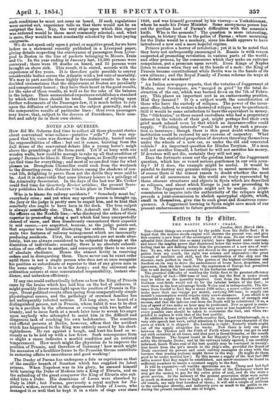itttrro to *r
THE BALTIC FLEET: COALS.
London, 30th March 1854. Sue—Great things are expected by the public from the Baltic fleet : it is hoped that the marine steam-engine will shorten the present war, and give this country a new lease of the sovereignty of the seas. No one who saw that splendid fleet (handled like so many yachts) leave Spithead under canvass,- and knew the mighty power that slumbered below the water-line, could help. feeling that he saw defiling before him the precursors of a new airs of war- fare. To me, who have witnessed and shared in the progress of steam-navi- gation from my youth, the sight was solemn and impressive—the great triumph of intellect and skill, and the combination of the ship and the steamer, each perfect in itself. The genius of the highest civilisation and freedom on its way to drive the embodiment of brute force, despotism, and ignorance, from the fair lands that the supineness of Europe has permitted him to add during the last century to his barbarian empire.
The practical difficulty of working the Baltic fleet to its greatest efficiency is the supply of fuel-1000 tons of coal each day the fleet is under steam may be taken as the quantity required. Coal from the Sunderland and Durham coal-fields would not do for the tubular boilers of the fleet; to work them to the best advantage South Wales coal is indispensable. The dis- tance from Cardiff to Kid Bay is about 1600 miles; a screw-collier would not make more than one voyage per month, carrying 500 tons; to supply one month's consumption would require sixty screw-steamers. I am afraid it is impossible to supply the fleet with this, its main element of strength and success, and that the inferior coal from the North will be substituted : if so, a loss of speed of two miles an hour may be predicated. Now as speed is essen- tial—as the difference of a mile an hour may save or lose hundreds of lives— every possible care should be taken to economize the fuel, and when ex- pended to replace it with that of the best quality. In addition to the quality of North-country fuel, Lord Ellenborough, in a very able speech last week, called attention to the dangerous character of the ports at which it is shipped. His Lordship is right; Easterly winds might cut off the supply altogether for weeks. Now there is only one port between the Thames and the Frith of Forth where vessels can get in and out with certainty at all times, and that port is Great Grimsby, at the mouth of the Humber. The largest vessel in her Majesty's Navy may enter with safety the Grimsby Docks; and by the railways lately opened, I am credibly informed, South Wales coal of the best quality may be conveyed in twenty- four hours from the pit's mouth to the ship's aide, provided the Board of Trade exercised its powers and made railway managers do away with the barriers that trading jealousy might throw in the way. (It might do them good to be under martial law.) By this means a supply of the best fuel 900- miles nearer Kid Bay might be established, and screw-steamers be found is sufficient numbers to insure a constant supply to the fleet.
It will be expensive—all warlike operations are so. Cheap and bad fuel may lose the fled. I could tell the Chancellor of the Exchequer where he may get the money to, pay for the extra price of coal, and do the state a great service. In the memory of the present generation ships were never so much in demand or bore so high a value: let the Admiralty sell off their old vessels, say only four hundred of them ; it will add a couple of millions to the exchequer directly, and indirectly save as much to the public in re-
ducing -the present exorbitant rate of freight. bteaceroa. '


































 Previous page
Previous page